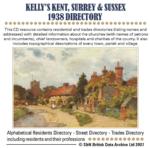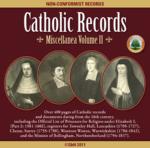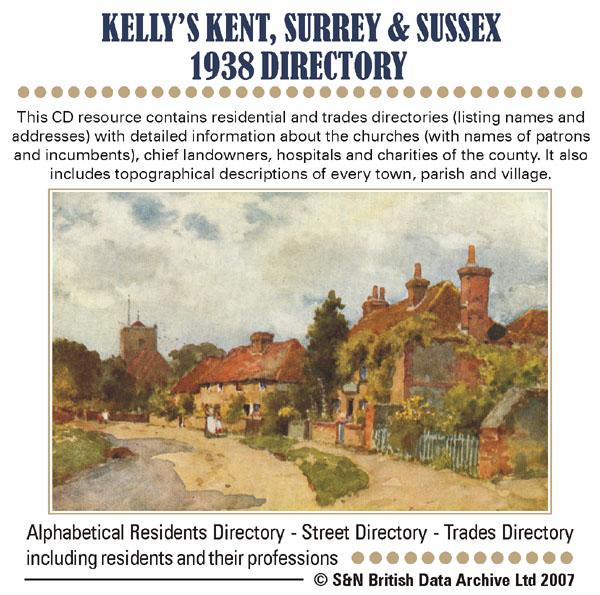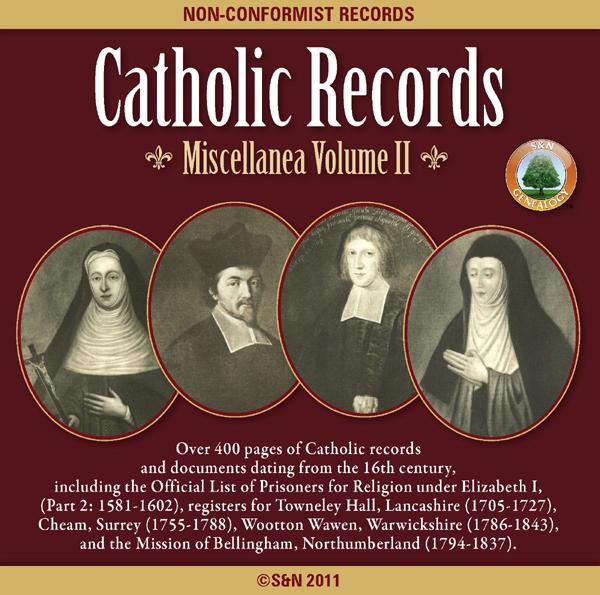Search Results for: “Surrey”
Kent, Surrey & Sussex Kelly's 1938 Directory

This CD resource contains residential and trades directories (listing names and addresses) with detailed information about the churches (with names of patrons and incumbents), chief landowners, hospitals and charities of the county. It also includes topographical descriptions of every town, parish and village. *Digitally enhanced images of the original text *Searchable text *Bookmarked by major headings *Fully printable *Contains over 3000 pages... More Info
Catholic Records: Miscellanea Volume 2 Special Offer

Catholic records and documents dating from the 16th century, with the Catholic registers for Towneley Hall in Lancashire (1705-1727), Cheam in Surrey (1755-1788), Wootton Wawen in Warwickshire (1786-1843), and the Catholic Mission of Bellingham in Northumberland (1794-1837). Also includes papers, memoirs, letters, and the second part of the Official List of Prisoners for Religion under Elizabeth I, covering 1581-1602. *Digitally enhanced images of the original text *Searchable text *Bookma More Info
Can't find what you're looking for? Try using our filter system to narrow down your search.
Available through our sister site GenFair
Overseas Membership of West Surrey FHS. Please fill in Customisation Box RENEWAL No,/NEW member. Thank you.
For persons living outside the UK only. Please state if Renewal and Membership No. or NEW member. Also accept new Privacy Statement with YES.
CD 06 1851 Census Index - Western Surrey.REDUCED PRICE.
The Indexes on this CD are exactly the same as those published on microfiche (MS21) in 1997. BUT with the advantages of being SEARCHABLE! The principal index lists 92,000 names, giving full name, age, birthplace and folio number. Then come 72 parish indexes with alphabetical listing of family groups, with the same details as above. It is followed by an index of BIRTHPLACES to assist in locating fa...More Info
Surrey Feet of Fines
What are Feet of Fines? Feet of Fines were records of fictitious suits at law, instituted in fact to obtain secure transfers of land. Fines survive from very early times to 1834 in the National Archives, Kew. The great value of fines is not just that they are arranged by county so as to facilitate topographical studies but they were often used to break entails, and thus it is quite usual for sever...More Info
Surrey Lay Subsidies
What are Lay Subsidies? By the end of the thirteenth century, land was no longer the only indication of a persons wealth, so a new tax, called Lay Subsidy was levied on movables. Not every householders name is to be found in the returns, because some were too poor to be taxed and clerical properties were assessed and taxed separately; hence the name Lay Subsidy. The Lay Subsidy Rolls can provide a...More Info
Family Membership to West Surrey FHS. Which includes two people at same address, but only one journal for address. UK residents. RENEWAL NO./NEW Member?
Annual Membership with four issues of "Root & Branch" journal. Year runs 1st April - 31st March. 50p administration charge included. PLEASE FILL IN CUSTOMISATION NOTE BOX if Renewal with membership No. or NEW Member.

